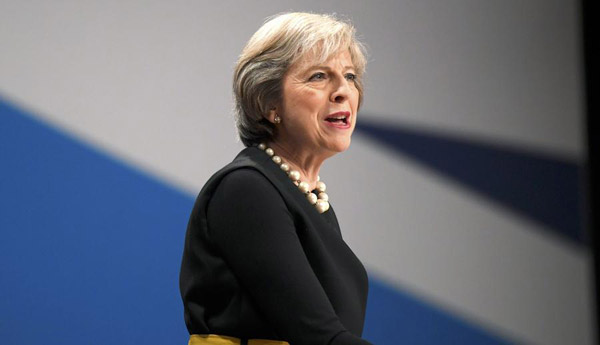 |
|
Britain's Prime Minister Theresa May speaks at the annual Conservative Party Conference in Birmingham, Britain, October 2, 2016.? [Photo/Agencies] |
British Prime Minister Theresa May has finally moved to tackle the uncertainty over Britain's planned exit from the European Union, putting flesh on the statement she made a few weeks ago that "Brexit means Brexit".
Setting a date by which she will trigger Article 50 of the Lisbon Treaty, the mechanism by which Britain gives two years' notice of its intention to quit the 28-member body, has ended speculation over a second referendum.
It has also ended the prospect that a parliamentary vote would overturn the decision to leave the EU, or that Article 50would be delayed indefinitely.
May's plans have already hit a brick wall. Although European Council President Donald Tusk welcomed her announcement that Article 50would be triggered by March, he lined up with other powerful EU figures, including German Chancellor Angela Merkel, in rejecting May's appeal for immediate talks on a new deal for Britain.
Analysts conclude that this almost certainly means a so-called hard exit, as Britain is unlikely to get single-market access without freedom of movement included, something Merkel and France's President Francois Hollande say is non-negotiable.
One of the main reasons for rejecting continued EU membership given in post-referendum surveys was the tighter control of UK borders, impossible under freedom of movement, which allows any EU national to move to the UK.
Akey part of May's announcement is that her government will present a "great repeal bill" to take effect the day the UK leaves the EU, at the end of the mandatory two-year period following the triggering of Article 50.
That parliamentary act, if passed, would immediately enshrine all existing EU rules and regulations as part of British law. Simply put, the government could subsequently pass individual acts of Parliament negating the rules or regulations that it doesn't like.
May, when she was home secretary, was keen to forge a deal where-by British courts were removed from the overriding European Court of Justice. After March 2019, she will be able to restore full sovereignty to the British legal system.
The "great repeal bill" proposal has blunted criticism from anti-EU activists, who are seeking an immediate departure.
May has bought some breathing space while she and her colleagues work on the next step of what she admits will be a massive task.
The size of this was brought home in recent days by news that because Britain had been a member of the EU since 1974, it had not negotiated separate trade deals, because all agreements had been handled by Brussels. That meant there were virtually no civil servants with experience of the complexities of negotiating trade agreements.
Australia has offered the services of 500 experienced civil servants, well-versed in trade negotiations, but like everything else surrounding Brexit, they will cost money.
The upside is that Britain will be free to negotiate individual trade deals-China, Australia, New Zealand and Canada have indicated their willingness to forge such ties.
The Institute of Fiscal Studies estimates that the increased cost of policing Britain's borders, for the trade negotiations and for the extra civil servants needed could be as much as 700 billion pounds ($900 billion) a year.
It said Britain was paying a net 9 billion pounds a year into the EU.